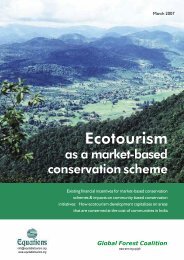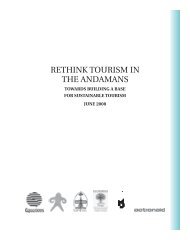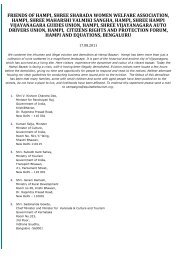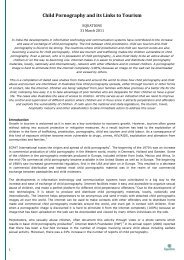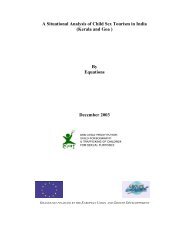Nilgiris Biosphere Reserve - Equitable Tourism Options
Nilgiris Biosphere Reserve - Equitable Tourism Options
Nilgiris Biosphere Reserve - Equitable Tourism Options
Create successful ePaper yourself
Turn your PDF publications into a flip-book with our unique Google optimized e-Paper software.
and foreign firms could be ruled as violating market access commitments<br />
[Article XVI1 of the particular countries under the GATS. The market access<br />
commitments clearly state that if you have made unlimited commitments you<br />
cannot limit the number of service providers. The only option is to hope that<br />
the MNC's have the good sense to realise that this will be unpopular with<br />
environmentalists and back off unilaterally. Laws can't throw them out.<br />
Conservation also implies that local people participate, but imposing<br />
requirements on foreign firms to train and hire local people could fall foul of<br />
the national treatment rules [Article XVII1 of the GATS.<br />
Article 1 [31 of the legal text of the GATS which talks of the scope of the GATS<br />
agreement mentions that in " fulfilling its obligation and commitments, each<br />
member shall take such reasonable measures as maybe available to it to<br />
ensure their observance by regional and local governments and authorities<br />
and non governmental bodies within its territory". This clearly implies that the<br />
GATS agreement has precedence if it comes into conflict with national,<br />
regional and local priorities. It clearly applies to all levels of government,<br />
central, regional or local governments and authorities. This also makes it<br />
clear that the government would be compelled to change the national laws in<br />
accordance to the commitments made.<br />
Potential conflicts:<br />
• No restrictions on tourism development through national<br />
environmental laws<br />
• Free trade principles: conflicts with CBO principles sustainability,<br />
local involvement, benefit sharing etc.<br />
2.10 Panchayats and <strong>Tourism</strong> Development<br />
The role of Panchayati Raj Institutions<br />
While seeking means to sustainable tourism development through<br />
conservation of biodiversity it could be observed that majority of tourism<br />
requirements rely on powers vested with the PRls. The Panchayats are<br />
empowered to safeguard and preserve the traditions, customs and cultural<br />
identity of the people, community resources and settling local disputes<br />
through customary methods. The Gram Sabha under the extended act is to<br />
approve plans, programmes and projects meant for social and economic<br />
development of the Village Panchayat prior to its implementation by<br />
Panchayats at the village level.<br />
NiJagiris : Fading Glory 62



